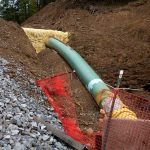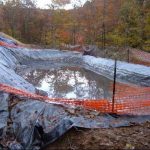- Like
- Digg
- Del
- Tumblr
- VKontakte
- Buffer
- Love This
- Odnoklassniki
- Meneame
- Blogger
- Amazon
- Yahoo Mail
- Gmail
- AOL
- Newsvine
- HackerNews
- Evernote
- MySpace
- Mail.ru
- Viadeo
- Line
- Comments
- Yummly
- SMS
- Viber
- Telegram
- Subscribe
- Skype
- Facebook Messenger
- Kakao
- LiveJournal
- Yammer
- Edgar
- Fintel
- Mix
- Instapaper
- Copy Link
Here is a brief update on some court cases we’ve been involved in or monitoring that affect West Virginia surface owners. Because one-third of WV-SORO members also own an interest in their underlying minerals, so we are including updates on cases that affect some mineral owners.
Surface Use Trespass
Although a driller might have the right to “reasonable use” of a surface tract in order to develop and produce the minerals underneath, WV-SORO takes the position that a driller cannot use a surface tract for a well pad, horizontal wells, etc. to develop neighboring mineral tracts without getting the surface owners’ consent. Although there are rulings in West Virginia Supreme Court cases dealing with coal that agree with us, and all the general legal treatises on oil and gas agree with us, there is not a binding state Supreme Court case on point establishing “precedent” that all Circuit Court judges would have to follow. As a result, drillers continue – pursuant to their sense of entitlement – to tell surface owners that they (the drillers) can come on to a surface owners land without permission.
In our last newsletter, we reported that one case headed to the state Supreme Court had been settled, but that WV-SORO co-founder David McMahon, together with David Grubb and Kris Whiteaker of the Grubb Law Group, had filed another case (Crowder and Wentz v. EQT Production Company). The good news is that Judge Sweeney in Doddridge County agreed with the plaintiffs, based on the merits of the case, that WV-SORO’s position is the law. Judge Sweeney “certified the question” to the Supreme Court since there currently is no controlling legal precedent in the state. Unfortunately, to everyone’s amazement, the Supreme Court turned down the certified question and refused to hear the case. In response, Judge Sweeney declared that his ruling still stands in this case, and that is very likely the way he will rule in other cases in his judicial circuit/district (Doddridge, Ritchie and Pleasants Counties). Judge Sweeney’s ruling can be found at www.wvsoro.org under the heading “You probably can refuse (or maybe block) a horizontal well on your land”.
One issue still to be decided in the Crowder case, which is scheduled for trial in April, is the amount of damages. After that, it could be appealed to the state Supreme Court. In the meantime, we are aware of several other active surface trespass cases that could make it to the state Supreme Court, and we will be assisting on those cases as we can by filing friend of the court briefs etc. Until the Supreme Court takes a case and issues a final ruling on the surface use question, WV-SORO will be looking for cases in other judicial circuits to get judges in those circuits to rule in favor of our position. If you know of any current or potential cases, please let us know.
The issue of compensation for damages, and how the compensation is calculated, are other matters for the courts to decide. Drillers are saying compensation should only be for what the acreage they take away from the surface owner was worth to the surface owner before the driller showed up. However, WV-SORO thinks that the surface owner’s damages should be based on what the use of the surface owner’s land is worth to the driller – measured as a percentage of the value of the gas produced or the profits of the driller. We’ll keep you posted on this as well. If you are involved in a surface damage case and want help with that issue, please let us know.
Eminent Domain/Survey Access for Interstate Pipelines
Our last newsletter included an article about pipeline companies suing landowners in order to conduct surveys on their lands. The surveys were being conducted for the companies’ applications to the Federal Energy Regulatory Commission (FERC). Once a pipeline company’s application is approved by FERC, the company has the right to use eminent domain to bring condemnation proceedings against, and put pipelines across the lands of, surface owners who do not willingly sign a right-of-way agreement.
In West Virginia, eminent domain can only be used for private enterprise projects if the property taken will be put to “public use”. Last year, the builders of the Mountain Valley Pipeline (MVP) took legal action against several landowners in West Virginia in order to gain access to their property to conduct surveys. However, some of the landowners fought back, arguing that the pipeline wasn’t for a public purpose because no West Virginians would have access to or otherwise use the gas carried by the pipeline.
There is good news on this front. First, Judge Irons in Monroe County ruled that the property owners could keep the pipeline company off of their land because all of the gas was being piped out of West Virginia and was not available for public use in West Virginia. Then, the pipeline company appealed the case to the West Virginia Supreme Court and the court agreed with Judge Irons, upholding his decision.
Despite the good news, there is likely to be an effort to get a bill through the Legislature on this subject during the 2017 session, similar to a bill that was defeated in the Senate during the 2016 session.
Mass Litigation on Nuisance
More than 200 West Virginia residents in at lease seven counties have filed nuisance suits related to excessive noise, light, dust, and traffic, and well as other problems, caused by horizontal drilling activities near their homes, which have interfered with their use and enjoyment of their land. (Frankly, we are surprised at the small number of nuisance suits filed.) The lawyers for the landowners, who first brought those cases in October 2013, moved in 2014 to have all of the cases decided by a panel of circuit court judges (called a “mass litigation panel”) instead of having them being tried separately by different judges in all the different counties.
These suits before the mass litigation panel are ongoing but suffered a setback. The judges ruled that surface owners above pooled mineral tracts being developed by horizontal wells on neighboring surface tracts couldn’t sue for nuisance. If the drillers are producing from the mineral tracts under the surface owners, the drillers have the right to do what is reasonably necessary on the surface tract in order to produce the underlying minerals. Those surface owners would still have claims if the driller was doing more than reasonably necessary to their land in order to get the gas under them out. This could be unreasonable noise or air pollution, or roads that are more disturbing or have more traffic than if it was only the mineral tract under their land being developed.
Flat Rate Leases and Royalty Deductions
Many old leases from early last century say the driller will pay a 1/8th royalty for oil. However, those leases were signed before pipeline infrastructure was around, at a time when gas was of little value. These leases said that the driller would only pay a flat rate, usually $100 or $300 a year, if gas was produced no matter how much gas was produced or what it got to be worth over time. This became grossly unfair over the years, but many of these old leases are still in effect “held by production”.
In the 1980s the Legislature passed a law often called the “flat rate royalty statute” that said if the driller drilled a new well under an old flat rate lease, or reworked an existing well, then the driller had to start paying 1/8th of the value of the gas “at the wellhead”. So drillers began doing this, although many of the drillers would take deductions from the 1/8th royalty for transportation, marketing, or “line loss”. (“Line loss” means if the driller does not maintain the lines and mineral owner’s gas leaks out, the driller does not have to reimburse the landowner for losing their gas – or it may mean that the driller’s various meters have not been maintained.)
The West Virginia Supreme Court has now applied its ruling in the Tawney v Columbia Natural Resources case to new wells drilled under flat rate leases. In Tawney, the Court ruled in favor of the plaintiffs, that the gas company had wrongfully deducted production costs and expenses from the royalty payments owed to the mineral owners. In the more recent case (Leggett v. EQT), EQT has filed for a rehearing before the Supreme Court. The ruling was a close 3 to 2 vote by the Justices and the company is no doubt hoping that newly elected Justice Beth Walker will tip the vote in their favor.
Who Owns Coalbed Methane?
In 2003, the West Virginia Supreme Court ruled in Energy Development Corporation v. Moss that leases and deeds that granted or reserved rights to “oil and gas” or “natural gas” did not give or reserve rights to coalbed methane (CBM) found in coal seams unless: 1.) the lease or deed specifically mentioned it or 2.) unless there was enough commercial CBM production in the area that it was contemplated by the parties. The issue is important to surface owners because under Moss surface owners can end up owning the CBM and the right to use or grant use of the surface to produce it, and because CBM wells have a greater impact on the surface than conventional vertical.
WV-SORO believes that the Court got it right in the Moss, even though it can lead to uncertainty in some situations. In the cases that have been brought in some of those situations, some of the parties have tried to argue that CBM should always belong to the coal owner or always belong to the gas owners whether it was contemplated by the parties or not at the time of the lease or deed.
The most recent case to reach the Supreme Court, Paulos v. LBR Holdings, the coal owner and the gas owner wanted the CBM. WV-SORO filed a friend of the court brief pointing out that the ruling had implications for surface use and surface owners.
Fortunately, the Court once again upheld Moss. Our brief was mentioned in footnotes 2 and 13 of the Court’s decision.
Can Drillers Pool Leases That Do Not Have Pooling Clauses?
We say, “No.” Unfortunately, because of a recent ruling by one Circuit Court judge in Tyler County, some drillers may be telling people that drillers do not have to have a pooling provision or pooling amendment to put leased tracts into a unit with other leased tracts. The drillers will say that the judge ruled that there is an “implied covenant” in all leases, even old ones, to do so. A driller may tell you this to get you to sign one of their unfair pooling provisions in a lease or an amendment. Don’t believe them! The judge’s ruling is wrong.
The thoroughness of the reasoning and the legal sophistry contained in the Circuit Court judge’s decision must be admired. However, the result is pure alchemy. Lead cannot be turned into gold, and the law and the questionable facts relied upon by the ruling do not, and should not, lead to the conclusion that there is an implied covenant to pool in all leases. In the words of a Farm Bureau lobbyist, there is no invisible ink in a lease.
WV-SORO has posted on its website eleven reasons why this ruling is bad and wrong, and other judges should not follow it. Do not let a driller intimidate you with this opinion.





